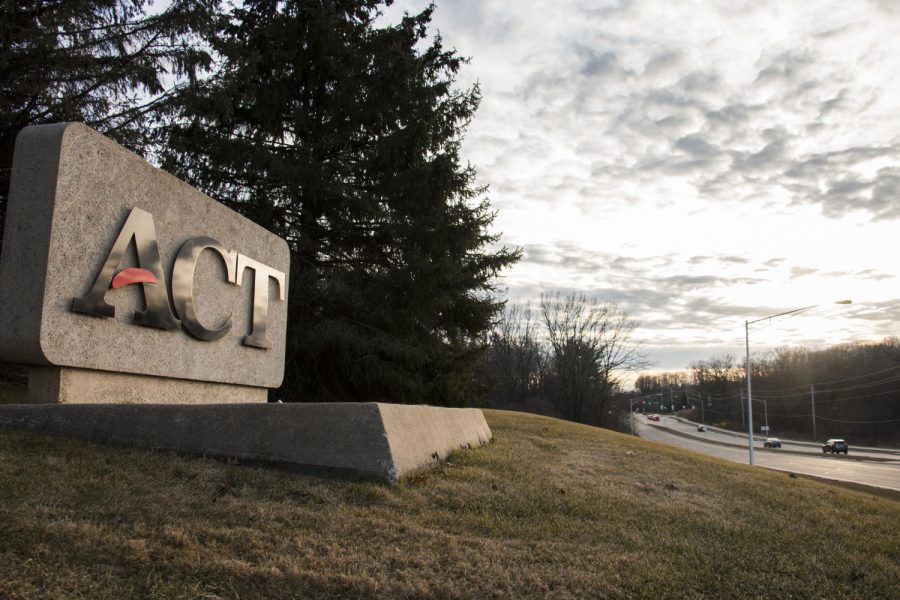New ACT section retakes and ‘superscoring’ create a ‘paradigm shift’ in the college admission process
Effective September 2020, the ACT will now offer students the option to retake individual subsections of their exam as part of a new “superscoring” method in hopes of better suiting student need.
The ACT sign is seen outside of the ACT Headquarters on Monday, March 5, 2018. ACT offices are expected to experience upcoming lay-offs.
October 14, 2019
Since administering their first test 60 years ago, the people working for the ACT in Iowa City have been considering what is the best way to measure a student’s college readiness.
ACT Senior Director for Public Media and Relations Ed Colby said the organization will make a series of changes to the test-taking process to better suit student need. These efforts, effective September 2020, will also move standardized testing into the modern era, Colby added.
First, the ACT will roll out online testing centers nationwide.
“We’ve wanted to move to digital for a long time, but we wanted to do it thoughtfully and gradually in a way that reflected the technology in our testing centers — which are usually in high schools,” Colby said.
RELATED: Regents will hear request to dissolve application portal for public Iowa universities
This change is significant, Colby said, because it reduces the amount of time students will have to wait for test results. With the traditional pencil-to-paper testing style, students can wait on results for two to eight weeks. Online testing offers a turnaround of just two days for the multiple-choice test portions, he said.
Flexibility is another key driving force behind these changes, Colby said, which is best reflected through the introduction of section retaking.
Students still need to complete the entire test, including grammar, reading, math, and science sections, Colby said. After this initial testing, students may retake any section they want to improve their scores in. The ACT will then take the highest subscores from every test session to calculate an overall “superscore,” Colby said.
“[ACT] did some research, and the results suggest that super scores are the most accurate predictor of college readiness,” he said.
University of Iowa Admissions Director and Assistant Provost Kirk Kluver said while the UI does not historically accept ACT superscores, these new changes to the test have caused it to re-evaluate current policy.
The UI currently uses the Regent Admission Index as part of its admissions process, which relies on criteria set by the state Board of Regents. The index weighs an ACT or SAT score in conjunction with other academic information, Kluver said, such as a student’s GPA.
The section retakes in particular create a massive paradigm shift in the college-admission landscape, Kluver said.
Individual subsection retakes incentivize students to take the ACT earlier and to take it more often, Iowa City High School student counselor Linda Hoel said.
“When you are taking a test and you think that this is your only shot, you tend to have a little more anxiety than if you know you have some options,” Hoel said.
The option to retake individual subsections lends itself to a more subject-centric type of preparation, Hoel said. Consequently, Hoel said students on all academic levels will likely be more motivated to retake tests, which could lead to more students meeting college admissions standards.
However, Kluver said the ACT changes raise concerns about equity in standardized testing.
“I can look at this and see the differentiation with how these superscores would be used for admissions purposes for students who are trying to get the right [Regent Admission Index] to be admissible to the [UI], versus how a superscore would be used for scholarship purposes,” Kluver said.
The ability to focus on one subsection at a time only benefits students with the financial means and academic resources to do so, Kluver said.
“If you look at historically disadvantaged populations, they tend to take the test later, and they don’t tend to take it multiple times,” Kluver said. “So, there is a concern that using a superscore as a component for merit scholarships will further increase the gap for students that come from underserved backgrounds.”
Colby said the ACT made these changes to their tests only after discussion with the most affected population — the students.
“We’re really excited about the new options students will have, and we hope that it will lead to a more positive testing experience for students all over the country,” Colby said.






